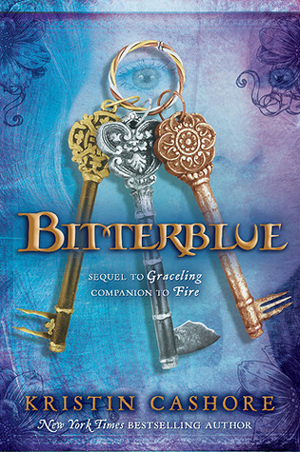Reviewed by clementine on
I guess I'll start there: I love this world. I love that it feels simultaneously modern and ancient. It obviously has a very medieval feel, what with the monarchical system, lack of modern technology, and general setup of society. The people in this world haven't quite latched onto the idea of democracy (though it's implied to be in the works), so they aren't as progressive as us in that sense... yet the medieval aspects of their society do not match up with how socially progressive they are about other issues. They seem to be about as accepting of same-sex relationships as the place I live (as in, many/most people accept it, but a significant amount are uncomfortable with it or just plain don't like it), women seem to be regarded much more highly than they were in actual medieval times, and sexual relationships outside of marriage aren't seen as THE MOST HORRIBLE SINFUL THING A PERSON CAN DO. For example, everyone in the seven kingdoms knows about Katsa and Po's relationship, and everyone seems reasonably cool with it. Man, I feel like I could write essays about these things. I want somebody to write something about Cashore's books and feminism, because there is so much there. Maybe I'll do it someday.
As with both of Cashore's other books, I absolutely loved the heroine. Bitterblue is badass to her core, just like Katsa and Fire. She knows what she wants, and she goes after it. Most importantly, I think, she's tough and strong without eschewing femininity, or essentially acting "male" while being female. I think this is so important, because it shows that you can be feminine (and female) while still being strong and in charge. Bitterblue also had her share of flaws. I especially appreciated how Cashore turned her erudite, high class status (well, I mean, she's the Queen) into a flaw. It's so easy for a character of Bitterblue's status not to have to acknowledge the painful reality of what their class means, but Cashore showed how being the Queen affected her relationships with others and her perception of the world, instead of just letting her live a blissful, cushy life.
As for the plot, I loved it. We got a nice mixture of action and explanation, and the world we see in Graceling and Bitterblue was very nicely tied to the Dells (which we saw in Fire). Some of what we found out Leck did made me feel sick, and I really felt for Bitterblue, having to find out the kinds of things her father did to her subjects. If I had that reaction as an outsider, I can't imagine what it would be like to find out your own father had done such things.
One thing I want to point out that I really liked is that all the drama didn't seem contrived. In the hands of a less skilled writer, I think that some of it, such as Thiel's suicide or the fact that Hava was Leck's daughter would have seemed really... after school special-y, I guess. But these events all fit with the story. And, related - I loved that I actually felt so much compassion for the people who lied to Bitterblue for all those years. No character was black and white good or evil, except for Leck, I suppose.
One last thing: I almost screamed when Fire appeared. I wish she'd had a bigger part because I LOVE HER SO MUCH. I was hoping she'd make an appearance, and EEEEEE.
So, yes, I loved it, I hope she writes more, I hope we get a sequel to Fire because YES, and... yeah. Very good.
Reading updates
- Started reading
- 11 October, 2012: Finished reading
- 11 October, 2012: Reviewed
